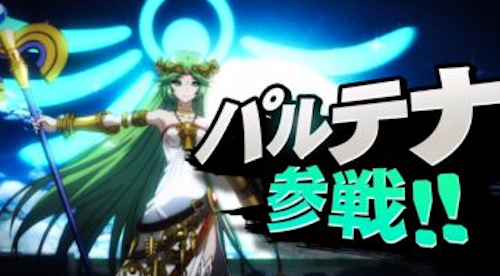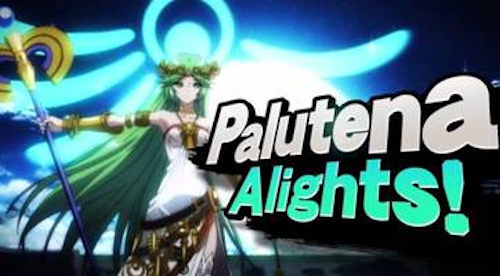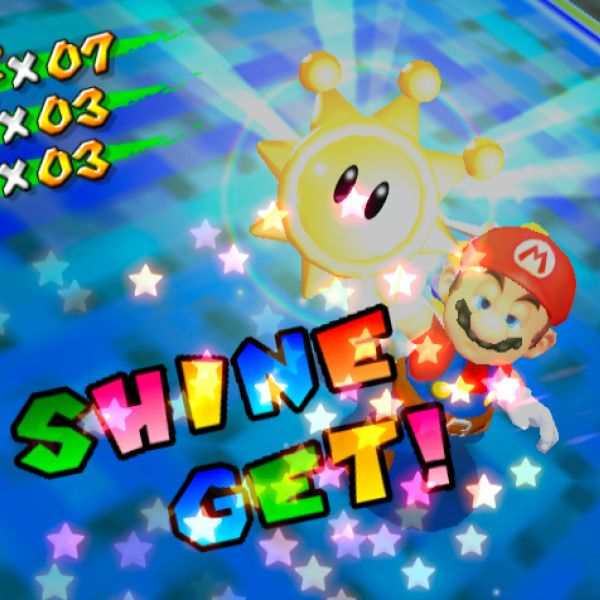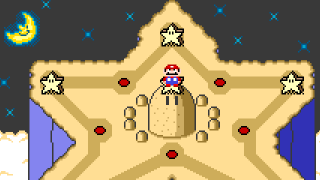 |  |
A reader by the name of Muhammad sent in a question about the name “Palutena” from the Kid Icarus games, and since she was also just recently announced for the new Super Smash Bros. game, it seemed like a perfect time to share it!
Hi, I recently started playing Kid Icarus for the first time, and I’m getting made fun of for calling Palutena by what I believe is a better translation of her name — “Palthena.” I was wondering you could do an article on what you would believe the best translation would be.
Her name in Japanese is Palutena — and it was kept this way in English even into modern times. However, she was based on Pallas Athena, and Parthena is one of her titles. So I’m of the opinion that calling her “Palthena” or “Parthena” is more accurate.
But, I’m not an expert. You are! So I would love to see your opinion.
Name translation is probably one of the biggest, most complicated, most headache-inducing part of an entertainment translator’s job. It’s such a big, broad topic that it deserves a whole series of articles, or even a site of its own! For now, though, I’ll just say that this particular issue is one I encounter all the time in my own work – how to handle foreign or foreign-sounding names that Japanese writers have adopted or created from scratch.
In this specific case, Palutena’s name seems to have a basis in Greek mythology, like most of the other names in the game. The problem arises from the fact that different languages often pronounce Greek mythological names differently. I could write a lot about the subject, but long story short, what we call “Athena” in English is called “Atena” in Japanese.
What does this mean for “Palutena”, then?
From the Athena spelling thing, my first instinct years ago was to think, “Hmm, I wonder if her name should be Paluthena instead.” Looking into it later, Japanese sites seemed to indicate that the name comes from “Pallas Athena”, in which case it would be logical to assume that “Palthena” is the correct English spelling. Other sites think it might come from the Japanese word for “Parthenon”, in which case “Parthena” would be the logical spelling. Others think it might come from the actual word “parthena” which supposedly means “maiden”, in which case the spelling would be as-is. Only the original creators would’ve known, I guess.
But! I’ve also learned from professional experience that Japanese creators don’t necessarily know that English pronounces Greek mythological names and words differently. So it’s very likely someone on the Japanese side of things wasn’t aware of this and set the English “Palutena” name in stone. Or maybe the translator wasn’t aware the name had an actual origin. In any case, the result is that “Palutena” became the official English spelling and pronunciation, regardless of any original intent.
There are a couple other things to note:
- Has the origin of her name ever come up in any official way, like in an interview or a manual or something? If so, let me know!
- I have no idea how Greek myth names are actually pronounced in ancient Greek – for all I know “Palutena” is a closer pronunciation than “Palthena” or “Parthena”. Hopefully someone can shed some light on this in the comments.
- As Muhammad mentions, the “Palutena” spelling has existed since the original NES game. It’s probably still that way in the modern games simply for legacy/consistency reasons:
![secret code: my0 nintendo0 sucks0 royaly secret code: my0 nintendo0 sucks0 royaly]()
Anyway, this multiple-name situation happens all the time, and there are always people who prefer the “official” way while others prefer the “correct” way. Hellsing’s Arucard/Alucard thing springs to mind. The Pokey/Porky thing from EarthBound and MOTHER 3 comes to mind, too. In my experience, as long as you’re able to get your point across to whoever you’re talking to, it usually doesn’t matter what you use.
Basically, this is all to say that I don’t have an answer to what the most accurate spelling should be, but I do agree that it’s likely Parthena or Palthena. Still, since there’s so much uncertainty about her name, I’d personally just stick with calling her Palutena unless some new info comes to light or something else happens. It’s a well-established name by now, so I doubt it’ll change.
Since this does involve three different languages and cultures going back and forth – including one I know nothing about – I’m sure I’m forgetting something significant. If so, let me know in the comments!







I do think it’s funny what they changed and what they didn’t in Kid Icarus Uprising. They corrected “Thanatos” with what amounted to a throwaway joke, but left “Hewdraw” when it’s clearly supposed to be a “hydra”. I think it adds a bit to the quirkiness though. That series has never had much of a fourth wall, considering the first game had credit cards.
Man, I own the 3DS game but haven’t played it yet – hearing about all this stuff makes me wish I had a big block of free time for gaming. It sounds like it’s a real fun game too!
It kills me that they fixed Thanatos but left “Palutena” and others alone. Over twenty years passed between the original game and Uprising, so only a few diehard fans would have even noticed the “legacy” names were changed.
*cough* *cough* Kid Icarus: Of Myths and Monsters *cough* *cough*
“Hewdraw” is “Hyuudora” in Japanese, its name was never actually supposed to be “hydra.” If its name were “Hydra,” the Japanese would be something like “Haidora” or “Hiidora” depending on Greek-to-Japanese translator competence. (There probably is an agreed-upon name for the creature in Japanese. I just don’t happen to know it.)
“Hewdraw” (or at least Hewdra) is likely an intentional corruption of the name, much like Perseus becoming Pit and Kerberos becoming Twinberos (and then Twinbellows in English).
In Japanese, the agreed-upon name is ヒュドラー hyudora: http://ja.wikipedia.org/wiki/%E3%83%92%E3%83%A5%E3%83%89%E3%83%A9%E3%83%BC
That’s where the Hewdraw translation comes from I assume.
Yeah, when the Japanese pronounce Greek names, I tend to see them pronounce all instances of “y” as ュ, as opposed to the English-speakers’ tendency to equate it to “i”. So for example, the river Styx becomes ステュクス Sutyukusu.
However, in this case, one vowel was extended, so the Nintendo character (ヒュードラー Hyuudoraa) isn’t quite the same as the creature of Greek myth (ヒュドラー Hyudoraa), which is probably why it was retained as “Hewdraw”.
Plenty of Japanese character names are written out more how they are spelled than how they are pronounced. For instance, Rockman is ロックマン Rokkuman, though they obviously didn’t intend for him to be called Roke Man or Roku Man. It’s ロック (Rokku) because of the ‘o’ in Rock, not the ‘ah’ sound in Rock.
Bottom line, it’s very likely they wrote Hyuudora because that’s what Hydra looks like, using the y’s normal y sound instead of making it a hard ī.
For British speakers, the O in rock is not at all an ‘ah’ sound; it’s a sound rather close to the Japanese O. Not only that, the sound of Hydra in Greek is the ’rounded oo’ of French ‘tu’; Japanese normally imports that as ユ ‘yu’. Japanese mostly uses standard British English pronunciations (note ‘draw’ in card games is ドロー, not ドラー), except in the case of word-final ‘er’ sounds, where it copies Americans with アー. And it imports Ancient Greek using the reconstucted Pronunciation of it, not other languages’ slightly (or greatly) bastardized pronunciations.
Hydra and Hewdraw are alightly different. Hydra is ヒュドラー (Hyudorā) while Hewdraw is ヒュードラ (Hyūdora)
I don’t know how much credence to put in them, but Scitron released a couple of albums in 2004 containing Kid Icarus music, and they have the Japanese name of the game パルテナの鏡 printed in English in different ways.
http://vgmdb.net/album/1435 -> “PALTENA NO KAGAMI”
http://vgmdb.net/album/404 -> “PALTHENA NO KAGAMI”
I’m mildly interested in whether there are any other, more official Japanese sources besides these.
Awesome, thanks for the info! I didn’t think to consult soundtracks!
I suppose you could take the stance that while the characters are based on those of Greek myth, they’re not supposed to actually BE those characters, and so they have slightly altered names as a result.
Totally, there’s a lot of different ways to look at fictional naming themes.
That’s very, VERY valid in this series. It’s clearly inspired by Greek Myth, but…it’s definitely not an accurate representation of them.
I would think that if they were willing to update Thanatos in the 3DS game, they would’ve done the same with Palutena if they felt it was needed. I prefer to just stick with what’s established as the official translation.
Yeah, if the answer were clear-cut it’d be one thing, but since there’s a cloud of uncertainty around it I feel it’s just better and saner to go with the official translation. I can understand the feeling of wanting to go what seems to be the more correct route, though. This conflict arises so much during my own work :O
I’m with Morgil here. If it’s consistently “Palutena” across the entire series, it seems to me that this character is intended to be called “Palutena.”
An anglicization of a character’s name not being revised has nothing to do with the original creator’s intent.
Besides, even though the translators corrected Tanatos to Thanatos, ヒュードラー, the Japanese name for the Hydra, was left as “Hewdraw” in the new game’s translation, so the translators were inconsistent even regarding “real” names.
Wait
“Hellsing’s Arucard/Alucard thing”
Are there seriously people who think it should be “Arucard”? They realize Alucard is “Dracula” spelled backwards, right?
From what I recall, the creator was absolutely insistent that it should be Arucard.
On the contrary, actually.
Alucard’s English voice actor, Crispin Freeman, fielded a question specifically about this at a con once: http://www.youtube.com/watch?v=9VjSfnhCNm8
Cool, thanks! It sounds like it was just a stubborn producer then 😛
I don’t know what the Greek pronunciation is for this particular example, but in general it seems like Japan tends to use the original Greek pronunciations over the latinized versions. Like Kerberos for Cerberus or Kentauros for Centaur.
Latin C is always hard. The soft C that we often associate with many Latin words is mostly based on pronouncing Latin with either English rules (in the case of science) or Italian rules (In the case of the clergy). The Latin Cerberus indeed sounds very much like the Greek Kerberos. (In fact, you may have heard of the Kerberos computer network authentication protocol, which has a short FAQ that covers this very subject. http://www.cmf.nrl.navy.mil/krb/kerberos-faq.html#cerberus)
It’s a pet peeve of mine — “Cerberus” definitely begins with a hard C. I remember being very annoyed with one or another of the Mass Effect games for getting “Cerberus” wrong in the same sentence in which they got “Charon” right. 🙂
Most countries do. English is pretty unique in that it just made up a bunch of new pronunciations based around what some dude thought the words looked like they should be pronounced. Greek-derived names particularly suffer from this.
Yo Tomato. Just thought it might be interesting, but Palutena is the “goddess of light and wisdom” in the Kid Icarus universe. Since Athena is the goddess of wisdom in Greek mythology, I think that Palthena is the correct choice over Parthena. However, パルテナ might have a double meaning as Parthena.
A good example might be the two-headed Twinbellows, the first boss of Kid Icarus and its 25 year sequel.
ケロベロス = Keroberosu = Cerberus
ツインベロス = Tsuinberosu = Twinberus, or so you’d think, right?
Well in Uprising, Twinbellows actually has BELLOWS on its back, as opposed to its original design where it does not. When it takes a certain amount of damage, it bellows with its mouth while using the bellows on its back. It might be a case of Project Sora taking the old English localization into account, but it seems to work as a double meaning to its name, just like Palthena/Parthena.
I think you’d have a blast with Uprising, because the localization just went wild and had a blast writing it. There’s a ton of humor, which might be right up your alley. You can even compare it to the original Japanese version on YouTube and you’ll notice dialogue differences right away. Definitely my favorite game on the 3DS, as well as one of my top games ever.
My only recommendation is to take your time getting a feel for everything. Customize the controls, get comfy with them, check out the tutorials (which are also humorous), and you’ll find a deeply rewarding game.
Ancient Greek (Attic) pronunciations, courtesy of wiktionary:
* Athēnã: /atʰɛ͜ɛná͜a/
* Pallás: /pal̚lás/
* Parthenṓn: /partʰenɔ͜ɔ́n/
* Parthéna: /partʰéna/
For those who are not used to phonetic symbols, these are roughly like:
* Ah – te (as in Tess, long) – nah (all ‘a’s pronounced as in Japanese, Italian or Spanish)
* Pal (“clear” /l/, raise your tongue tip) – las
* Par (the ‘r’ taps as in Italian or Japanese) – teh (as in the very start of “table”) – no (as in “thought” in American East Coast pronounciation)
* Like “Parthenṓn” but ends with “ah”
If we’re comparing the English pronunciation of “Palutena”, “Parthena” and “Palthena” with the original sounds:
– Writing the second syllable as “te” does come closer to Attic than using the “th” spelling, since the latter is pronounced as a fricative /θ/ in English. However, were I the translator, I’d use “th” anyway, for two reasons: 1) Modern Greek changed /tʰ/ to /θ/ anyway, and 2) traditional English pronounciations of Greek names, strange though they are, use /θ/ for Athena and Parthenon and I wouldn’t want to lose the connection.
– That extra /u/ in “Palutena” simply isn’t there in the Greek. Compared to “Palthena”, it would have the side benefit of preventing English speakers from “darkening” the /l/ to [ɫ] (as they always do with syllable-final /l/), but that’s not a big improvement IMO. You get something but lose another.
If one reads “Parutena” with Japanese pronounciation, it does get closer to Attic than the English reading of either “Parthena” or “Palthena”. But that’s mostly a side-effect of how Japanese vowels and consonants are
not as weirdmore like the Greek; it’s not something inherent in the spelling. If *Palthēna was intended (as in a portmanteau from Athēnã), then the Japanese will fail to pronounce the /l/, but the anglophones would “darken” it, so both would deviate (also probably パルテーナ would be better in this case).tl;dr—I agree, “Parthena” or “Palthena” would be preferable to “Palutena”. Perhaps “Paltena” to keep it closer to the old manuals.
Woohoo! Thanks for that info, you rock!
This kinda reminds me of how the ミドガルズオルム in FF VII was translated as Midgar Zolom, which is a pretty good transliteration. Though I’m not sure I’d call it a good translation because the name was intended to be Midgardsormr.
In FF6, Midgardsormr was called Terrato, and in FF3 he’s called Jormungand.
Yeah, most of the translators got it right. They kinda go back and forth between Midgardsormr and Jormungand, the names have been used for various enemies in the series.
Hmmm. This is very interesting. Never knew the origin of Palutena’s name. Seemed quite unrelated to Greek myth before, but now it makes sense.
παρθένος (parthenos)means “maiden” or “virgin girl.” Athena was understood to be a virgin goddess, and that’s why the temple in her city Athens was named the Parthenon (place of the virgin, more or less.) The name Parthena, though it could exist in Greek, I guess, is really more made up. I think the devs of Kid Icarus though the “a” at the end made it sound like a more typically feminine Mediterranean name. Clearly, though, they intended Parthena, whether you pronounce that with a hard t or not.
Japanese transliteration once again gives us so many possibilities!
Great work, I continue to read with much interest
What is that word underneath パルテナ? The Japanese word, not the English equivalent, it’s bugging me that I can read everything in that picture except for that word.
It basically means “joined the battle” – I posted about it here the other day, in fact: http://legendsoflocalization.tumblr.com/post/88584728457/a-common-question-i-get-is-what-does-this
Ah it’s 参戦. Thanks, that’s what I was looking for.
Almost entirely unrelated, but the english wordplay is a localization touch I really like. Each announcement has a unique style, letting the character’s individual personality color the trailer(favorite example: Greninja being announced “stealthily” by hijacking Charmander’s announcement. And I’m not particularly a Pokemon person.).
The unique phrases add a bit to that consideration, in my opinion.
It was Charizard. Not Charmander. 😛
OHMYGOD, YOU HAVE A TUMBLR!!ONE!
Yeah, if you mentioned that before, I missed it.
Speaking of Smash Bros, does anyone know what the Japanese fans thought of the latest character reveals? I’m particularly curious what the responses were for Pac-Man
Nice analysis as always. In a similar vein, I was wondering what the intended name is for the Nintendo villain “Marx” – in Kirby Super Star, you’d think it’s supposed to be Mark from the katakana (マルク), but it doesn’t appear to have changed in localization since English names of all the major bosses are easily seen in the last game mode (incidentally, the only listed name that was changed was “Battle Windows” to “Computer Virus”). However unlikely this may seem, is it possible that the one letter off wasn’t just a mistake that Nintendo of America ran with, meaning it’s intended to be written as Marx because in another language the same name pronounced similarly to Mark?
That’s pretty odd. Marx (as in Karl Marx) is マルクス in Japanese, not マルク. Maybe they decided to change the name because Mark didn’t sound “foreign enough” in English, like Tina becoming Terra in the English version of Final Fantasy VI? Whatever the reason, I think it’s a deliberate change, rather than a mistake.
マルク and the above talk about Japanese transcription of Greek and Latin reminds me of Marth, whose name in Japanese is マルス. マルス is how the Roman god Mars’s name is written in Japanese. For whatever reason, intentional or not, this became “Marth” in English. There was another マルス in the NES Ninja Gaiden who became “Malth” in English.
Both Kirby’s “Marx” and Fire Emblem’s “Marth” are spelled as such in the original Japanese versions of the game. These aren’t something English translators came up with.
I don’t know about Monsho no Nazo, but I can confirm that’s not the case in the first Famicom game.
I can confirm that you’ve never actually beaten the first Famicom game 😛
http://www.youtube.com/watch?v=RsHzXjJ23PU&t=41m55s
…Touché! I’ve honestly only gotten about halfway through, and I thought at that point the only English would be the intro.
Is that so? I swear I saw Marth spelled as Mars somewhere.
Eh, I’m probably wrong.
Mars was how they named him in the dub of the Fire Emblem anime.
I’m not sure why, but now in my mind Fire Emlem will always remind me of Pokemon and Sailor Moon.
There’s this weird inside joke in both FF5 and FF6. In FF5, there is a Mime named Gogo that guards the Mime Crystal shard in the sunken Walse Tower, in FF6, Gogo is a recruitable character named Gogo who is a Mime that lives in the monster Zone Eater.
There’s this weird inside joke in both FF5 and FF6. In FF5, there is a Mime named Gogo that guards the Mime Crystal shard in the sunken Walse Tower, in FF6, Gogo is a recruitable character named Gogo who is a Mime that lives in the monster Zone Eater. I want to see if they have anything in common in the Japanese version.
I know almost no Japanese… I probably learned more about Japanese the first hour I was on this site than I did the rest of my life up until that point. However, I do know quite a bit about Grecoroman myths, and there are two main reasons that I think that the “Pallas Athena” theory is correct (and thus it should probably be translated as Palathena or the like).
1) Palutena was chosen specifically the be a direct foil to Medusa (or maybe it was the other way around, but it’s clear that the two were definitely meant to directly oppose one another). In the original myths, it was Athena that cursed Medusa and turned her (and her sisters) into a gorgon, just as Palutena turned Medusa into her monstrous form.
2) The Japanese title was called Palutena no Kagami, which if my pre-toddler level Japanese is not mistaken, translates to Palutena’s Mirror. In the myth of Perseus (who is NOT who Pit is based off of, nor is it Icarus- he’s actually based off Cupid/Eros, but that’s another discussion altogether…), Athena gave Perseus a mirrored shield so that he could look into the reflection and thus see and fight Medusa without himself being turned to stone. Thus, it was Pallas Athena’s Mirror that ultimately killed Medusa.
Mind you, this is only using clues from the original game- seeing as the second one was made by NoA and Uprising was made by a completely different crew, I feel they should have no bearing on the discussion (and besides that, I can’t think of anything in Uprising to add or detract from this anyways). Though I’ll fully admit there’s a major hole in my logic: Kid Icarus is so loose with the myths, that it makes Marvel’s Thor seem like an accurate representation of Norse mythology in comparison. But still, these two clues seem to indicate that they were indeed trying to reference the original Grecoroman myths, or at least they do to me.
On another note, I don’t think I’d want to see you doing a full dissection of Kid Icarus: Uprising. Because of the comedy-heavy nature of the game’s dialogue, it’s clear that it’s something that had to heavily edited to work in another language, and while I do wish I could understand the original Japanese version, I very much love what the translation team did, and absolutely adore its tongue-in-cheek humor. The problem with doing a long comparison of the translation to a proper translation is that doing a proper translation would have likely killed the dialogue, as so much humor is language dependent, and that never works well when translated directly.
Parthena is an actual Greek feminine name: https://en.wikipedia.org/wiki/Parthena